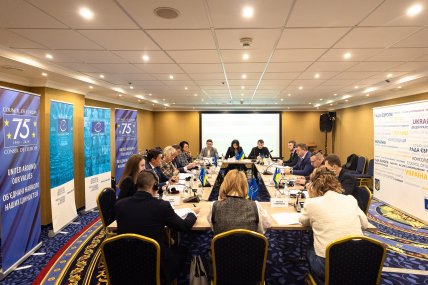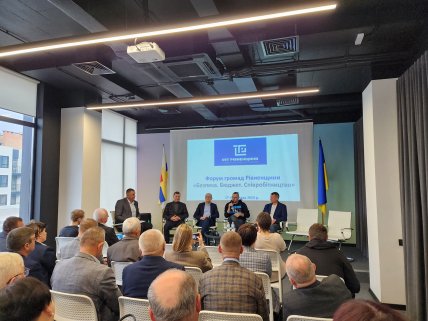The administrative-territorial structure in Ukraine will be adjusted, according to an MP, regarding upcoming reforms and changes post-war.
In spring 2025, the Ukrainian government plans to unveil an updated concept for local self-government reform. This key document will primarily address the new military context impacting communities, while also being grounded in established principles of financial independence and decision-making freedom.
To discuss the changes local authorities should anticipate, "Telegraph" spoke with Ukraine's MP and chairman of the subcommittee on administrative-territorial organization and local self-government Vitaliy Bezgin.
Different territories exist in varying dimensions
- April this year marked the 10th anniversary of the local self-government reform. Is the need to update the concept due to outdated norms or the adjustments required by the full-scale war?
- Several factors have contributed to the necessity for updating this foundational document. Firstly, you are correct that the full-scale invasion has significantly impacted the demographic landscape and the viability of territories and their governance. Secondly, our Euro-integration processes have also played a crucial role. This idea emerged in agreement with our European partners during the Ukrainian delegation's visit to Strasbourg last summer, which included representatives from central and local authorities. Since this document will be approved as a government resolution, it will essentially be a governmental act of replacement. We expect it to be ready by March 2025.
- What stage is the development at currently?
- We have commissioned the Council of Europe to review the current document. Last week, a report was submitted to the parliamentary committee and the ministry, detailing which points have been completed and which require adjustments. Following this, approximately from mid-December, the expert group will begin working on the document. We anticipate receiving a draft of the document in January. In February, there will be several rounds of public consultations involving experts, local self-government workers, and international partners. Afterward, the government will take time to revise the document.

- What do European experts believe needs to be changed?
- When discussing territorial governance and post-war recovery, we must recognize that some communities are operating in different dimensions. I mean that we have always relied on a unified territorial management approach. It is now clear: communities bordering the Russian Federation, which have undergone depopulation, will undoubtedly require a completely different management approach compared to agglomerations in right-bank Ukraine, where businesses have relocated, drawing in corresponding human and financial resources. This will lead to changes in tax regulations and the redistribution of taxes.
We will discuss these matters for the first time, as such issues were not raised, nor were these challenges faced by Ukraine in 2014. Certainly, we had the temporarily occupied Crimea back then, but the rest of Ukraine developed relatively evenly. Now, this imbalance is catastrophic and must be taken into account. Thus, in addition to changes in the fundamental legislation on local self-government, adjustments to the Tax and Budget Codes will undoubtedly be necessary.
– Can we say that there will be some system of subsidies for such regions?
- The current equalization system, based on basic and reverse subsidies, is clearly outdated and will definitely be revised. By the way, in the Resilience Plan presented in parliament by the president, there is also a section titled "Communities." It states that some communities are frontiers, and some will still need support even after the war ends, as they border Russia. We understand that such a hostile neighbor will not disappear overnight.
- Will financial independence for regions, one of the core principles established by the 2014 reform, remain?
– Absolutely! Moreover, I believe additional tools for financial independence will emerge. This primarily concerns the administration of local taxes, particularly in terms of data exchange with the tax authorities. We expect this, and I hope that similar initiatives will finally be unlocked in the tax committee.
– Can we say that the updated concept will provide regions with more financial independence and freedom in decision-making?
- Yes, local self-government bodies will gain more freedom and financial resources, but finally, also accountability, which is a problem we face. I am convinced that accountability must be introduced for making knowingly illegal decisions. Thus, independence must be balanced with accountability; otherwise, it won't function effectively.
- What have EU experts marked as "completed" in the 2014 reform?
– Almost everything has been completed, in fact. The administrative-territorial reform has been carried out, direct budget decentralization has been established, tax processes have been streamlined, etc. The only thing that has not changed is the Constitution of Ukraine regarding the implementation of state oversight over the legality of decisions made by local self-government bodies and the delineation of powers between central and local authorities. All other aspects have been acknowledged positively by European experts. Even the latest legislative initiatives that came into force this year, such as international territorial cooperation. I share the view that this is a correct decision, as it has been made in the context of Euro-integration.
There is no consensus on managing communities under occupation
– Regarding the correction of administrative-territorial organization – what plans are in place in this direction? For example, will the ATGs under occupation possibly merge with those controlled by Ukraine?
- These are somewhat questions from different planes, so let’s separate them. First, we see that a new methodology for assessing the viability of communities will emerge in 2025. Yes, we anticipate that post-war, there will be a correction of the administrative-territorial organization. This is an inevitable process for the simple reason that some territories have been completely devastated, not only in terms of human potential, as they have virtually depopulated, but also in terms of destroyed infrastructure. Therefore, the correction of the administrative-territorial organization is certain, but we can only discuss this substantively after the war ends.
Let me explain why. Any changes must rely on current statistical data. They should primarily concern the people living in a given territory. Until the war concludes and our internally displaced persons determine whether they will stay in the communities they relocated to or return to their homes, it is very challenging to model and forecast how the changes will be implemented accurately. However, we plan to adopt the rules and legislative frameworks within which these changes will occur by 2025.
- To clarify, if we take a hypothetical Bakhmut or Avdiivka, where there is neither a community left, nor property, nor infrastructure, but military administrations and bureaucratic apparatus remain...
– This question is more complicated. There are differing opinions in the power corridors on this matter, so there is no unified solution yet. I can only express my personal opinion. I advocate for the continued operation of military administrations in all temporarily occupied territories. Moreover, I believe that as of today, territorial communities should be established on the territory of Crimea, which is the only region where this has not been done, and military administrations should also be implemented there. Again, this is my personal position!
You are correct that among the negative aspects – the existence of military administrations incurs state expenses. However, on the other hand, without an authority that is preparing and developing plans for the first steps after de-occupation, I cannot imagine how a well-functioning management system can be established in such territories, especially in those that have been under occupation for a long time.

- At the same time, Mariupol still has a city council led by the mayor. Why was a military administration not created in this temporarily occupied city?
– Indeed, we have several communities where military administrations were not established. This is part of our negotiating position with international partners. In Mariupol, there are a large number of internally displaced persons and support programs funded by international donors. The latter are very reluctant to provide resources for military administrations, which is why decisions were made to maintain local self-government bodies in exile (from Latin – in exile Ed.). In particular, Mariupol has an active mayor who is the full-fledged leader of the temporarily occupied city.
- And he is heavily criticized by Mariupol residents...
– Look, it's rare for residents not to criticize someone. It’s difficult for me to assess how effectively resources allocated to support Mariupol residents, who have been forced to leave their homes, are being utilized.
- Returning to military administrations, in one of your posts regarding the update of the reform concept, you mentioned plans to return to a civilian governance format. Is this a current task or a long-term one?
The transition will definitely take place in the post-war period because while we are under martial law, there is no alternative to the military administrations that have already been established, and the law does not provide for their dissolution. However, the rules for the transition and the security criteria for conducting or not conducting local elections in a given territory must definitely be approved before the end of the war and prior to the next elections. We are working on their development. This is absolutely justified, as there is a direct requirement from our European partners in this regard, and it is primarily a matter of common sense, as it is very difficult to discuss